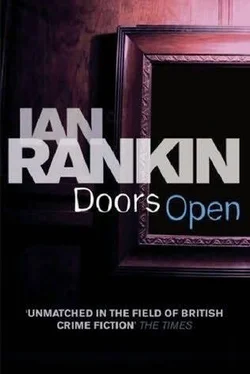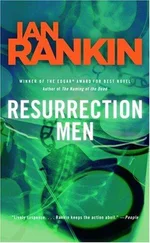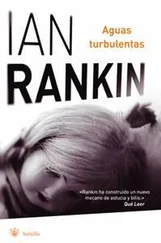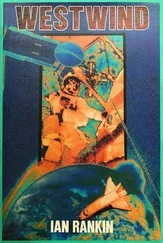
Copyright © 2008 John Rebus Ltd.
The open door was only yards away, and beyond it lay the outside world, eerily unaffected by anything happening inside the abandoned snooker hall. Two thickset men had slumped bloodily to the floor. Four more figures were seated on chairs, hands tied behind them, ankles bound. A fifth was wriggling like a snake towards the doorway, straining with the effort. His girlfriend was yelling encouragement as the man called Hate stepped forward and slammed the door shut on all their hopes and dreams, hauling the chair and its occupant back to the original line.
‘I’m going to kill you all,’ the man spat, face smeared with his own blood. Mike Mackenzie didn’t doubt him for a second. What else was someone called Hate going to do? Mike was staring at the door, reminded that this chain of events had begun – so innocently – with a party and with friends.
And with greed.
And desire.
But above all, with doors opening and closing.
Mike saw it happen. There were two doors next to one another. One of them seemed to be permanently ajar by about an inch, except when someone pushed at its neighbour. As each liveried waiter brought trays of canapés into the saleroom, the effect was the same. One door would swing open, and the other would slowly close. It said a lot about the quality of the paintings, Mike thought, that he was paying more attention to a pair of doors. But he knew he was wrong: it was saying nothing about the actual artworks on display, and everything about him.
Mike Mackenzie was thirty-seven years old, rich and bored. According to the business pages of various newspapers, he remained a ‘self-made software mogul’, except that he was no longer a mogul of anything. His company had been sold outright to a venture capital consortium. Rumour had it that he was a burn-out, and maybe he was. He’d started the software business fresh from university with a friend called Gerry Pearson. Gerry had been the real brains of the operation, a genius programmer, but shy with it, so that Mike quickly became the public face of the company. After the sale, they’d split the proceeds fifty-fifty and Gerry then surprised Mike by announcing that he was off to start a new life in Sydney. His emails from Australia extolled the virtues of nightclubs, city life and surfing (and not, for once, the computer kind). He would also send Mike JPEGs and mobile-phone snaps of the ladies he encountered along the way. The quiet, reserved Gerry of old had disappeared, replaced by a rambunctious playboy – which didn’t stop Mike from feeling like a bit of a fraud. He knew that without Gerry, he’d have failed to make the grade in his chosen field.
Building the business had been exciting and nerve-racking – existing on three or four hours’ sleep a night, often in hotel rooms far away from home, while Gerry preferred to pore over circuit boards and programming issues back in Edinburgh. Ironing the glitches out of their best-known software application had given both of them a buzz that had lasted for weeks. But as for the money… well, the money had come flooding in, bringing with it lawyers and accountants, advisers and planners, assistants, diary secretaries, media interest, social invites from bankers and portfolio managers… and not much else. Mike had grown tired of supercars (the Lambo had lasted barely a fortnight; the Ferrari not much longer – he drove a second-hand Maserati these days, bought on impulse from the small ads). Tired, too, of jet travel, five-star suites, gadgets and gizmos. His penthouse apartment had featured in a style magazine, much being made of its view – the city skyline, all chimneypots and church spires until you reached the volcanic plug on top of which sat Edinburgh Castle. But occasional visitors could tell that Mike hadn’t made much of an effort to adjust his life to fit his new surroundings: the sofa was the same one he’d brought from his previous home; ditto the dining table and chairs. Old magazines and newspapers sat in piles either side of the fireplace, and there was little evidence that the vast flat-screen television with its surround-sound speakers ever got much use. Instead, guests would fix their attention on the paintings.
Art, one of Mike’s advisers had advised, was a canny investment. He’d then gone on to suggest the name of a broker who would ensure that Mike bought wisely; ‘wisely and well’ had been his exact words. But Mike learned that this would mean buying paintings he didn’t necessarily like by feted artists whose coffers he didn’t really feel like filling. It would also mean being prepared to part with paintings he might admire, solely to comply with the fluctuations of the market. Instead of which, he had gone his own way, attending his first sale and finding a seat right at the front – surprised that a few chairs were still vacant while people seemed content to stand in a crush at the back of the room. Of course, he had soon learned the reason – those at the back had a clear view of all the bidders, and could revise their own bids accordingly. As his friend Allan confided afterwards, Mike had paid about three grand too much for a Bossun still life because a dealer had spotted him as a tyro and had toyed with him, edging the price upwards in the knowledge that the arm at the front of the room would be hoisted again.
‘But why the hell would he do that?’ Mike had asked, appalled.
‘He’s probably got a few Bossuns tucked away in storage,’ Allan had explained. ‘If prices for the artist look like they’re on the way up, he’ll get more interest when he dusts them off.’
‘But if I’d pulled out, he’d’ve been stuck with the one I bought.’
To which Allan had just shrugged and given a smile.
Allan was somewhere in the saleroom right now, catalogue open as he perused potential purchases. Not that he could afford much – not on a banking salary. But he had a passion for art and a good eye, and would become wistful on the day of the actual auction as he watched paintings he coveted being bought by people he didn’t know. Those paintings, he’d told Mike, might disappear from public view for a generation or more.
‘Worst case, they’re bought as investments and placed in a vault for safe keeping – no more meaning to their buyer than compound interest.’
‘You’re saying I shouldn’t buy anything?’
‘Not as an investment – you should buy whatever pleases you…’
As a result of which, the walls of Mike’s apartment were replete with art from the nineteenth and twentieth centuries – most of it Scottish. He had eclectic tastes, so that cubism sat alongside pastoral, portraiture beside collage. For the most part, Allan approved. The two had first met a year ago at a party at the bank’s investment arm HQ on George Street. The First Caledonian Bank – ‘First Caly’ as it was more usually called – owned an impressive corporate art collection. Large Fairbairn abstracts flanked the entrance lobby, with a Coulton triptych behind the reception desk. First Caly employed its own curator, whose job it was to discover new talent – often from degree shows – then sell when the price was right and replenish the collection. Mike had mistaken Allan for the curator, and they’d struck up a conversation.
‘Allan Cruikshank,’ Allan had said, shaking Mike’s hand. ‘And of course I already know who you are.’
‘Sorry about the mix-up,’ Mike had apologised with an embarrassed grin. ‘It’s just that we seem to be the only people interested in what’s on the walls…’
Читать дальше













